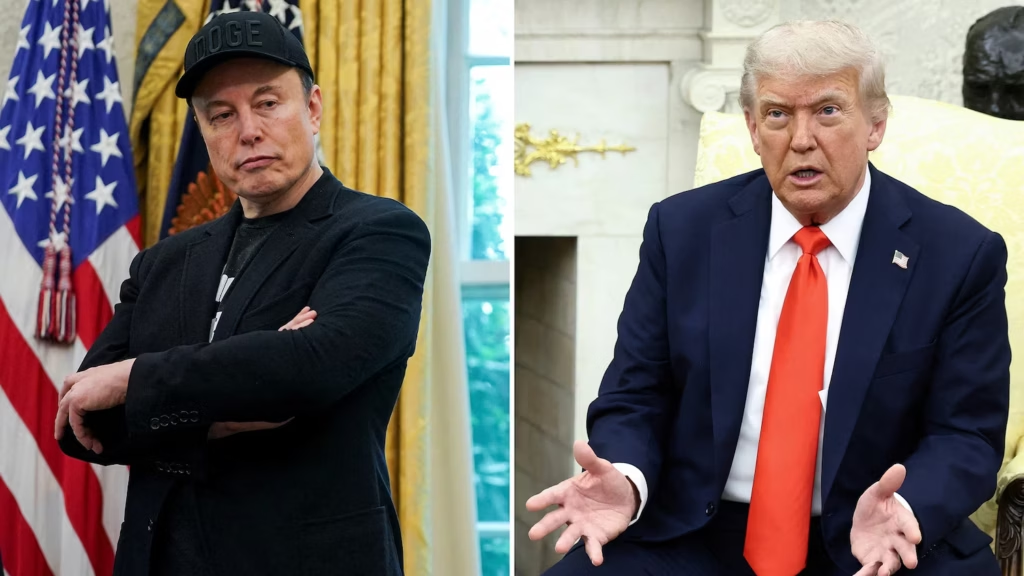
Trump vs Musk: The High-Stakes Feud Rocking the USA with Global Ripples to Dubai
In a stunning escalation of tensions, Donald Trump, the former President of the United States, has publicly accused Elon Musk of “losing his mind,” turning what was once a strategic alliance into a fierce feud. The fallout between two of the world’s most prominent figures—Trump, one of America’s most powerful political voices, and Musk, the richest man alive and a global tech titan—could have far-reaching implications, not just for the USA, but also for global economic and political landscapes, including business and tech hubs like Dubai.
From Political Allies to Public Adversaries
What began as a cooperative relationship during Trump’s presidential campaign and early White House tenure has unraveled into a full-blown political and personal conflict. The latest flare-up started after Musk launched a highly critical social media attack on Trump via X (formerly Twitter)—a platform he owns and has increasingly used to amplify political content.
Musk’s posts accused Trump of being named in the so-called “Epstein files,” referencing documents connected to the late financier and convicted sex offender Jeffrey Epstein. Trump’s reaction was immediate and cutting. In a phone interview with ABC News, he dismissed Musk entirely, saying, “You mean the man who has lost his mind?”
Trump later told CNN, “I’m not even thinking about Elon. The poor guy’s got a problem,” making it clear that the chances of reconciliation were slim. Ironically, Musk had donated nearly $300 million to support Trump’s political ambitions—a figure that highlights the depth of their previously close ties.
Why Dubai Is Watching
While the feud is unfolding in the USA, the aftershocks are being felt in global business centers like Dubai. The UAE city, often described as the “Silicon Valley of the Middle East,” has long positioned itself as a magnet for global tech entrepreneurs and investors—including those closely watching the moves of Elon Musk.
Musk’s ventures, particularly Tesla and SpaceX, have a growing presence in the UAE and the wider Middle East. Tesla’s electric vehicles are popular in Dubai’s luxury automotive market, and the company’s sustainable energy initiatives align closely with Dubai’s smart city goals. Additionally, Starlink, Musk’s satellite broadband venture, has begun attracting attention in Dubai’s tech and communications sectors, where reliable, high-speed internet is a priority for remote areas and infrastructure development.
The breakdown of Musk’s political connections in the USA could alter his strategy internationally—potentially redirecting more focus and investment toward emerging tech hubs like Dubai, where innovation is actively welcomed and supported.
A Rift with Real Consequences
The Musk-Trump feud is not just a matter of egos. It could shape U.S. elections, government contracts, and the future of critical industries. Trump has reportedly threatened to cancel Musk’s federal contracts—including those awarded to SpaceX by NASA, which currently depends on the company’s Dragon spacecraft to transport astronauts to the International Space Station.
Though Musk quickly reversed an earlier statement about halting the Dragon program, the incident highlighted just how much control he holds in the U.S. space program. That control, however, now seems increasingly vulnerable to political retaliation.
The stakes were made even higher when Steve Bannon, a prominent Trump ally, suggested Musk should be deported from the United States. Musk, who was born in South Africa but is now a U.S. citizen, faced harsh scrutiny overnight, with many critics calling into question his political motivations and business ethics.

Economic Fallout: A $33 Billion Loss in One Day
The feud isn’t just a political drama—it’s an economic bombshell. On Thursday alone, Elon Musk’s net worth plummeted by $33 billion, largely due to a 14.2% drop in Tesla shares, which wiped out $152 billion in company value. While Tesla’s stock rebounded by 6% the next day, the incident serves as a stark reminder of how intertwined Musk’s public image is with the financial health of his ventures.
Interestingly, the White House confirmed that Trump now plans to sell his personal Tesla Model S, signaling a further breakdown in any remaining goodwill between the two men.
A New Political Era?
Musk, who has flirted with the idea of starting a new political party, suggested on X that the U.S. needs a movement “that actually represents the 80% in the middle.” With his massive personal wealth and a massive online following, Musk has the resources to reshape political narratives in the U.S.—a move that could also influence how tech policy, AI regulation, and renewable energy strategies unfold not only in America but also in Dubai and other global cities.
Dubai, which often aligns its future vision with tech pioneers, may watch this political detour closely. Any shift in Musk’s global strategy due to domestic U.S. politics could open doors for more collaboration or even relocation of focus from U.S. markets to tech-forward regions like the UAE.
A Moment of Reflection
Despite the intense exchange, some signs of diplomacy remain. In a response to hedge fund manager Bill Ackman, who urged the two men to make peace for the sake of the country, Musk appeared to hint at reconciliation. However, the White House Chief of Staff, Susie Wiles, stated there are currently “no plans” for a call between the two.
What It Means for Dubai and the Global Tech Ecosystem
This rift underscores the fragile balance between business and politics in the tech world. As Dubai continues to position itself as a global tech hub with ambitions in space technology, AI, EVs, and blockchain, Elon Musk’s shifting alliances and unpredictable moves may have a more significant impact on regional strategy and investment flows than previously anticipated.
For Dubai-based investors, entrepreneurs, and policymakers, understanding the implications of such high-profile clashes in the U.S. is crucial. With Musk’s potential pivot toward markets that offer fewer political entanglements, Dubai could very well be on the receiving end of new opportunities—if it plays its cards right.
Conclusion
The Trump-Musk conflict is more than just a war of words. It’s a high-stakes drama with the power to impact elections, economies, and innovation on a global scale—from Washington D.C. to Wall Street, and from Silicon Valley to Dubai. Whether this feud fizzles out or ignites long-term political and economic shifts remains to be seen—but one thing is certain: the world is watching.




